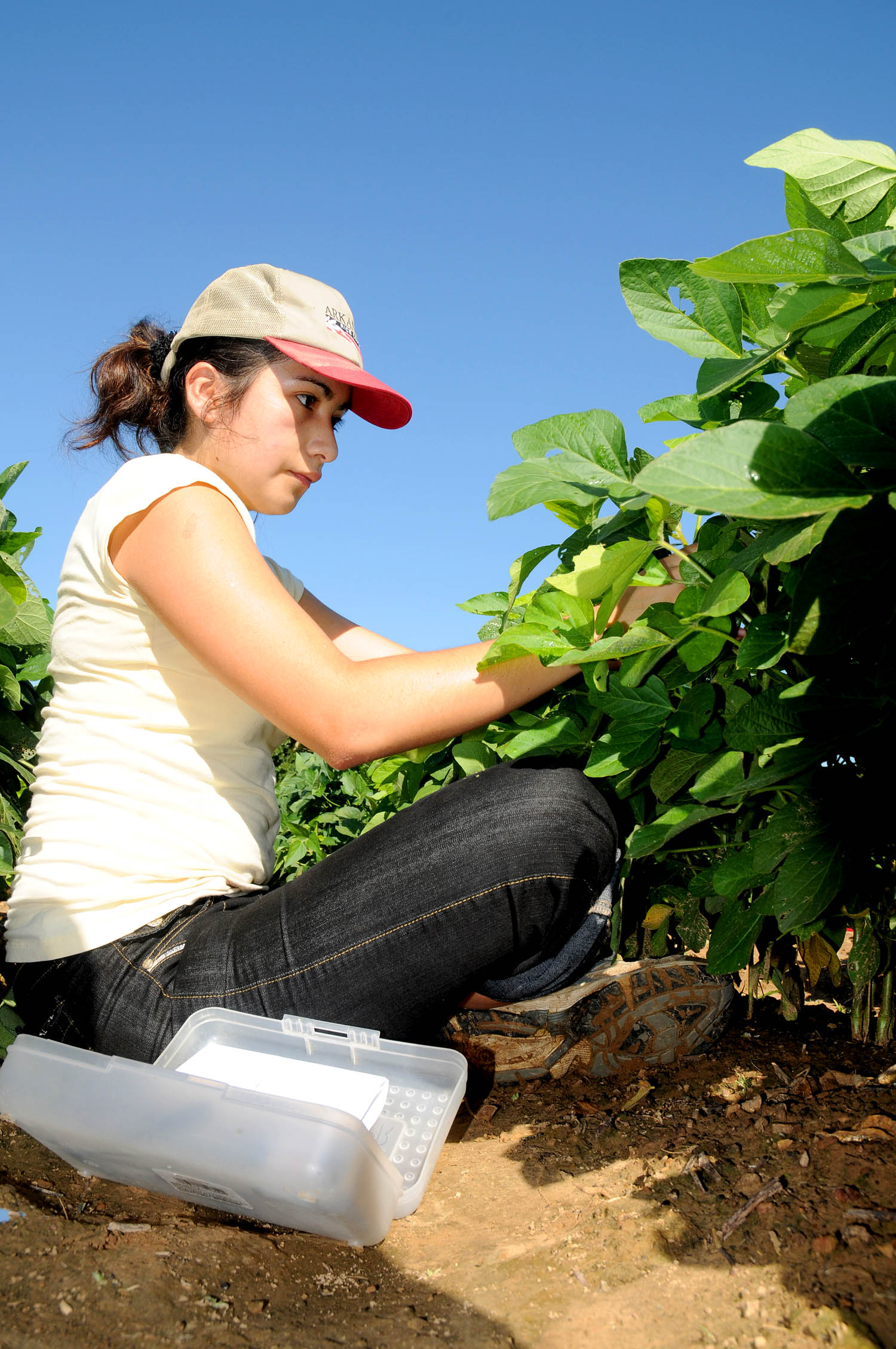High-Oil Soybeans in Pipeline for Arkansas Variety Development

Liliana Florez collects pollen from soybean flowers for use in what will be about 9,000 attempts this summer to cross desirable genetic traits of selected plants in the soybean breeding program at the Arkansas Agricultural Research and Extension Center, Division of Agriculture, University of Arkansas System, in Fayetteville.
ROHWER, Ark. — “If we build it they will come,” could be the motto for an initiative to develop Arkansas adapted soybean varieties with higher than average oil and protein content in the University of Arkansas System Division of Agriculture’s soybean breeding program.
Soybeans that yield more oil and protein are more valuable for use in food, feed, fuel and many other products, but farmers aren’t paid for the difference unless they contract with a specialty products firm. The main market for farmers is the generic commodity market.
In a few years, producers may be in a position to add marketing options with new varieties that routinely produce 15 pounds of oil per bushel compared to the current average of about 12 pounds in varieties with comparable yields, said Bryan Stobaugh, a Division of Agriculture researcher.
Stobaugh discussed the high-oil soybean breeding objective at a July 30 field day on crops for biofuel production at the Division of Agriculture’s Rohwer Research Station in Desha County, which is a unit of the Southeast Research and Extension Center at Monticello.
The research plot tour for the field day was rained out, but researchers gave presentations on their projects to develop the information farmers will need to produce “next generation” cellulosic biofuel feedstock crops such as switchgrass, cottonwood and sweet sorghum.
Future Energy Crops. When emerging technology to refine fuel products from the cellulose in plant stems and leaves becomes economically feasible, a commodity market for “energy crops” could develop for Arkansas farmers, agricultural economist Michael Popp said.
Popp and other field day speakers discussed the environmental and economic implications, as well production requirements, for such a major addition to the state’s agricultural sector.
Matt Pelkki, a natural resource economist with cottonwood and switchgrass studies at Rohwer, said lumber companies already use biomass to fuel wood-burning power plants, and they market biomass pellets for wood-burning furnaces. Such use could greatly expand if electric utilities are required to use a mandated percentage of renewable energy sources, he said.
“In Arkansas, its not likely to be wind or solar, but it could be biomass,” Pelkki said of meeting a renewable energy source mandate.
Renewable alternative fuels have already had a major impact on Arkansas agriculture. Increased demand for corn, soybeans and other oilseeds used for biofuel has resulted in higher crop prices and larger acreages of those crops.
Development of high-oil soybeans is an example of Division of Agriculture support for producing feedstock for the current biodiesel markets.
Stobaugh is a graduate student assistant of Pengyin Chen, who directs the division’s statewide soybean breeding program based at the Arkansas Agricultural Research and Extension Center in Fayetteville. He is the son of Conway County farmer Robert Stobaugh, a longtime promoter of biodiesel production and use.
The elder Stobaugh, who attended the field day, said he would expect soybean buyers servicing the biodiesel industry to pay a premium to farmers who can deliver high-oil soybeans.
The average oil content of commodity soybeans in Arkansas is about 20 percent, Bryan Stobaugh said. Breeding lines developed by Chen over a period of years average 25 percent oil, which translates into three pounds more oil from a bushel of beans.
Chen’s high-oil breeding lines maintain comparable levels of protein as current varieties, but yield is lower. Stobaugh said the yield component is being steadily improved by backcrossing, but it will take several years to reach the desired combination.
The target is high oil, average or better protein, and high yield for a variety release, Stobaugh said. Chen is also considering earlier release of a high-oil variety with a small yield drag, which would benefit growers who get paid for oil content until the high-yield, high-oil target is reached.
Meanwhile, Stobaugh said a high-yielding Group IV variety is near the end of the pipeline for release. Genetically pure foundation seed grown in 2010 should be available to seed growers in 2011.
‘Osage,’ an Arkansas variety released in 2007 by the Division of Agriculture, was used as a high-yield check variety in the 2008 and 2009 USDA Uniform Trials, due to its excellent performance for yield and other traits across a range of environments, Stobaugh said.
Headlines
PetSmart CEO J.K. Symancyk to Speak at Walton College Commencement
J.K. Symancyk is an alumnus of the Sam M. Walton College of Business and serves on the Dean’s Executive Advisory Board.
Faulkner Center, Arkansas PBS Partner to Screen Documentary 'Gospel'
The Faulkner Performing Arts Center will host a screening of Gospel, a documentary exploring the origin of Black spirituality through sermon and song, in partnership with Arkansas PBS at 7:30 p.m. Thursday, May 2.
UAPD Officers Mills and Edwards Honored With New Roles
Veterans of the U of A Police Department, Matt Mills has been promoted to assistant chief, and Crandall Edwards has been promoted to administrative captain.
Community Design Center's Greenway Urbanism Project Wins LIV Hospitality Design Award
"Greenway Urbanism" is one of six urban strategies proposed under the Framework Plan for Cherokee Village, a project that received funding through an Our Town grant from the National Endowment for the Arts.
Spring Bike Drive Refurbishes Old Bikes for New Students
All donated bikes will be given to Pedal It Forward, a local nonprofit that will refurbish your bike and return it to the U of A campus to be gifted to a student in need. Hundreds of students have already benefited.




